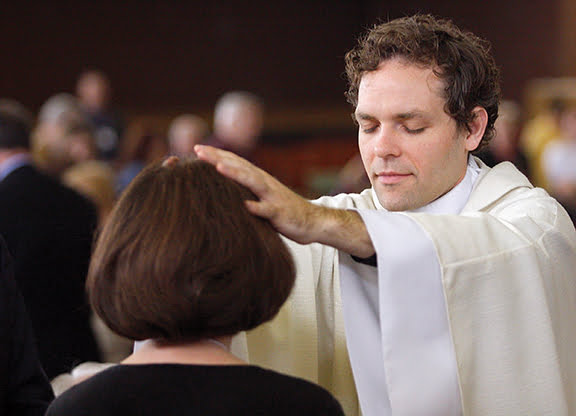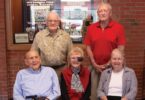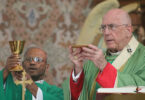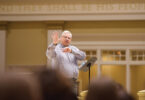 by Joe Bollig
by Joe Bollig
joe.bollig@theleaven.org
It’s a scenario you might see played out in an old movie on a classics channel.
Johnny, the bad boy with the heart of gold, is dying in the street. “Quick,” someone yells, “call a priest.”
And in short order, good old Father O’What’s-His-Name shows up and offers Johnny “extreme unction.” Johnny dies in a state of grace, and all is well.
It’s great drama, but can generate a very confused understanding of an important sacrament.
Before the Second Vatican Council (1962-1965), the church referred to one of the seven sacraments as extreme unction.
The “unction” part refers to the oil of the sick. The “extreme” part refers to the practice of anointing someone with that oil, along with certain prayers, when that person was “in extremis” — that is, experiencing physical distress with the likelihood of dying.
People got the idea that extreme unction was a sacrament to be administered only when someone was about to die, so they would wait for someone to be at death’s door before they’d call a priest to administer the sacrament.
The Fathers of the Second Vatican Council set things straight in the Constitution on Sacred Liturgy (“Sacrosanctum Concilium”):
“‘Extreme unction,’ which may also and more fittingly be called ‘anointing of the sick,’ is not a sacrament only for those who are at the point of death. Hence, as soon as any one of the faithful begins to be in danger of death from sickness or old age, the fitting time for him to receive this sacrament has certainly already arrived” (No. 73).
In brief, the Council Fathers taught these were two distinct things that were sometimes associated:
• The sacrament of the anointing of the sick is a sacrament of healing for the sick and infirm, but may also be given to the dying.
• The “last rites” are the celebration of viaticum (receiving the Eucharist by someone approaching death), along with the Commendation of the Dying and Prayers for the Dead.
Back to the future
The scriptural basis for the sacrament of the anointing of the sick is found in the Letter of James:
“Is anyone among you sick? He should summon the presbyters of the church, and they should pray over him and anoint [him] with oil in the name of the Lord, and the prayer of faith will save the sick person, and the Lord will raise him up. If he has committed any sins, he will be forgiven” (5: 14-15).
Father Roger Schmit, OSB, administers the sacrament of the anointing of the sick to people every day as a chaplain at Providence Hospital in Kansas City, Kan., and St. John Hospital in Leavenworth.
“We need to realize that this is a sacrament of the living,” said Father Roger. “It’s not a sacrament of the dead.”
It’s a prayer for healing, but it’s important to understand three things, he said.
The first is that all healing comes from God, who uses other people — doctors, nurses, therapists and others — to bring about healing.
The second is that this healing doesn’t happen according to our agenda, which might be complete physical health and healing. It happens according to God’s agenda.
“I’ll give you an example,” said Father Roger. “There was a man in the hospital who was very distraught . . . about the fact that he was diagnosed with cancer, and the man was very afraid. “
“We celebrated the sacrament of the anointing of the sick,” Father Roger continued, “and right after [it was celebrated] he looked at me and said, ‘Oh, Father, I’m not afraid any more.’ That is healing. He died from the cancer, but he was no longer afraid. It’s healing according to God’s agenda, not yours or mine.”
The third thing to understand is the healing in the sacrament is about the whole person — and that includes healing from sin. An example can be found in the Gospels of Luke and Mark. A sick man was let down through the roof of a house and, before Jesus physically healed the man, he said, “Your sins are forgiven.”
“We have to keep in mind what our understanding of illness is,” said Father Roger. “[Anointing] is a sacrament, it is a mystery, like the other six sacraments are.”
Celebrating the sacrament
The sacrament of the anointing of the sick is not intended to be private. Like other sacraments, it is to be celebrated with others.
Father Francis Hund, pastor of the Church of the Nativity in Leawood, remembered first celebrating the sacrament when his father was in the hospital.
“For me, the sacrament of the anointing of the sick is indeed a ‘God moment,’” he said. “It can be moment when someone who has lived many years . . . shares the wisdom of their age as we pray together.”
This sacrament can be for the elderly or young children, for the terminally ill or those who will recover, for those who need physical as well as spiritual healing.
And it can be experienced anywhere. Although Father Hund first experienced the sacrament in a hospital, it can be celebrated in people’s homes and in churches as well. Many parishes offer the sacrament on a monthly or annual basis. Often, people will schedule an opportunity to celebrate the sacrament before a scheduled surgery.
“I would encourage anyone who is sick to receive the anointing and do that as soon as they possibly can,” said Father Hund. “Don’t stay away from the Eucharist and the anointing, trying to figure out God’s timing.
“Use the gift of time God gave us today to receive the sacrament.”
Celebrate the sacrament thoughtfully
Although there are occasions when it is appropriate to call for a priest to rush to a hospital to offer the sacrament of the anointing of the sick, this is not necessary or even advisable.
The sacrament of the anointing of the sick is not strictly a preparation for death, but rather a prayer for healing. People should not wait until the last minute to ask a priest for anointing, one reason being that a priest may not be available.
Q. Does someone have to be dying to receive this sacrament?
A. No. The sacrament is for those whose health is seriously impaired by sickness or old age.
Q. My mother has already been anointed by the hospital’s Catholic chaplain. Should I call her pastor so she can be anointed again?
A. Your mother doesn’t need to be anointed again during her hospital stay, but go ahead and let her pastor know she’s in the hospital. He’ll appreciate being informed and will no doubt stop by if he is able.
Q. I’m scheduled for surgery next month and would like to be anointed. Should I wait until the day of surgery?
A. No. Contact your pastor and let him know that you would like to be anointed before going to the hospital. He will let you know when this should be done.
Q. Can someone receive this sacrament more than once?
A. A person can be anointed more than once in his or her lifetime, but once or twice a year is adequate, unless the person’s condition worsens significantly.
Q. Can sick children be anointed?
A. Yes, if they have the use of sufficient reason to be strengthened by the sacrament.
Q. Should a priest be called to anoint someone who has already died?
A. No. This is a sacrament for the living, so you should simply pray for the person who has died. Do call the parish office to notify your pastor of the death of your loved one, however, and for help with funeral arrangements.
Q. Do I have to be in a hospital to receive this sacrament?
A. No. Many people receive it at home or at their parish. Some parishes have a special Mass or time to anoint the elderly or ill of the parish on a regular basis. It’s always best to celebrate this sacrament with others.
Q. Do I have to go to confession first?
A. That depends. If you are alienated from God by mortal sin, then, yes, you should receive the sacrament of reconciliation first. Ask the priest.
Q. What kind of healing is the sacrament intended to provide?
A. Some form of healing takes place, but it isn’t always physical healing. With the sacrament, we pray that a person be healed in body, soul and spirit. Ultimately, all sacraments are for a greater understanding of God’s mysteries and to receive the grace that will bring us to eternal life. This sacrament is not a substitute for the work of doctors and nurses, because God works through medical professionals.






